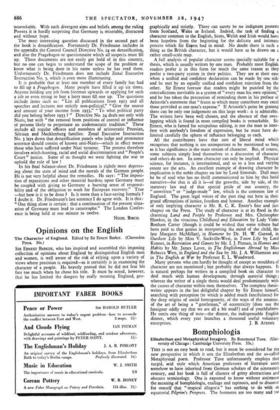Opinions on the English
SIR ERNEST BARKER, who has inspired and assembled this imposing collection of opinions about England by distinguished English men and women, is well aware of the risk of relying upon a variety of views where precision is required—as it certainly is in examining the character of a people. He bravely proved that he did not fear his fate too much when he chose his title. It must be noted, however, that he has limited the dangers by really meaning England, geo-
graphically and strictly. There can surely be no indignant protests from Scotland, Wales or Ireland. Indeed, the task of finding a character common to the English, Scots, Welsh and Irish would have been hopeless from the beginning for the delicate and intimate process which Sir Borst had in mind. No doubt• there is such a thing as the British character, but it would have to be drawn on a rather small-scale map.
A full analysis of popular character seems specially suitable for a thesis, which is usually written by one man. Probably most English readers prefer it in this form for much the same reason as they prefer a two-party system in their politics. They are at their ease when a unified and confident declaration can be made by one side and be met by an equally unified and confident rejection from the other. Sir Ernest foresaw that readers might be puzzled by the contradictions inevitable in a system of " every man his own opinion," and he has taken the precaution of reminding them in his preface of Aristotle's statement that " feasts to which many contribute may excel those provided at one man's expense." If Aristotle's point be granted there can be only one judgement on this large work : it is admirable. The writers have been well chosen, and the absence of that over- lapping which is found in most compiled books is remarkable. Sir Ernest, who is famed for scrupulous editing, is not the man to inter- fere with anybody's freedom of expression, but he must have de- limited carefully the sphere of influence belonging to each. All the contributors have that sort of liberal mind which recognises that nothing is too unimportant to be mentioned so long as it has significance in the main stream of character. But, of course, some subjects simply lend themselves to a discussion of character and others do not. In some character can only be implied. Physical science, for instance, is international, and so to a less and varying extent are the arts. An excellent example of drawing character by implication is the noble chapter on law by Lord Simonds. Dull must he be of soul who has no thrill communicated to him by this lucid narrative—for that is all it is—of the growths, side by side, of the statutory law and of that special pride of our country, the " unwritten " or " judge-made " law, which is the common law of England. The great legal voices of the past ring out here in their grand affirmations of justice, freedom and honour. Another example of only implying character is Mr. R. C. K. Ensor's fine and just chapter on the Press. The study of character is at its flood in the charming Land and People by Professor and Mrs. Christopher Hawkes, in the vivacious Childhood and Education by Lady Violet Bonham Carter (though it could be wished that some tribute had been paid to that genius in interpreting the mind of the child, the late Margaret McMillan), in Humour by Dr. H. W. Garrod, in Outdoor Life by Miss V. Sackville-West, in Town Life by Lord Kennet, in Recreation and Games by Mr. I. J. Pitman, in Homes and Habits by Mr. James Laver, in The Englishman Abroad by Miss Rebecca West, in England and the Sea by Mr. J. A. Williamson and in The English at War by Professor E. L. Woodward.
Many persons who can hardly be thought of except as moulders of character are not mentioned ; but probably that always happens. It is natural perhaps for writers in a compiled book on character to deal much with human development through material things ; whereas the writer of a single thesis would deal predominantly with the causes of character within men themselves. The complete thesis- writer appears in the last delightful chapter by Sir Ernest himself, searching with perception (to which is added much fancifulness) for the deep origins of social homogeneity, of the ways of the amateur, of the art of being a " gentleman," of eccentricity (does not the foreigner oddly say that we are all a bit mad?) and of youthfulness. He omits one thing of note—the dinner, the indispensable English dinner, which every year launches a thousand useful voluntary




























 Previous page
Previous page